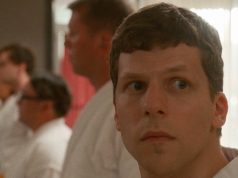“Kung Pow: Enter the Fist” has a marvelous premise but fails completely due to some fundamental misunderstandings of the ways of comedy.
The idea is that Steve Oedekerk got a hold of a long-forgotten 1976 martial-arts film called “Tiger & Crane Fists.” He redubbed the dialogue, shot some new scenes, and digitally inserted himself into the action, thus creating a movie that is a parody of karate flicks in general, and a “Mystery Science Theater”-style mocking of this one specifically.
The problem is that I only know all this because I read the press kit. The movie itself does not make it clear, and how is the audience supposed to laugh along with your concept if it doesn’t know what the concept is?
Yes, the movie begins with a title card telling us that “Tiger & Crane Fists” has been given new voices and soundtrack. But then the very first scene has a CGI baby kung fu fighting two bad guys — a scene that obviously has been made from scratch, not rescued from a cellar and redubbed. Our assumption, then, is that they were kidding about the “new voices and soundtrack” thing, and that they’ve made an all-new movie — intentionally bad — and put in silly dialogue.
But then we have scenes that really DO look old, and where the dubbed dialogue makes fun of the action. For example, a man’s robe keeps changing colors from one shot to the next, and the dubbed voice of the man speaking to him makes reference to it. Are they making fun of an actual old movie? If so, funny. Or did they make a new movie and make it bad on purpose so they could make fun of it? If so, not funny, because they’re setting up straw men just so they can knock them down. Not knowing which is the case, the audience is left to puzzle things out and determine whether this is good comedy or bad comedy.
The audience has to understand the premise. It’s OK to lie to the audience, but it has to be clear that you’re lying. Conan O’Brien has a feature where he shows us “actual ads” from actual newspapers. He insists these are real advertisements, and that you couldn’t make this stuff up. And then it’s obvious from the first example that they ARE made up, and that one of the things he’s mocking is the late-night talk-show staple of showing humorous newspaper clippings (like Jay Leno’s “Headlines”).
“Kung Pow” begins by telling us it’s an old movie redubbed, but then includes obviously new scenes seamlessly integrated with the old ones. They’ve done such an ingenious job of putting new footage with old that they’ve undermined their own comedy.
And then there’s another problem: The redubbed dialogue isn’t very funny. There are moments, yes — the aforementioned robe-changing bit is good, assuming you catch on that this really IS an old scene — but there are far more instances of strained, wimpy humor. Having the mouths out of sync with the words is funny … but not forever. Giving the characters silly voices is funny … but not forever. Nearly every joke goes beyond the realm of humor and into the realm of being over-done. It’s the perfect example of a movie that should have been 15 minutes long.
Steve Oedekerk wrote “Patch Adams,” for which he should not be forgiven. Why he was given free reign over this project — he wrote, directed, starred and produced — is beyond me. With some more brains involved, it could have turned into a wonderful, wacky movie. Someone should have been there to tell Steve he was completely screwing it up.
F (1 hr., 21 min.; )





